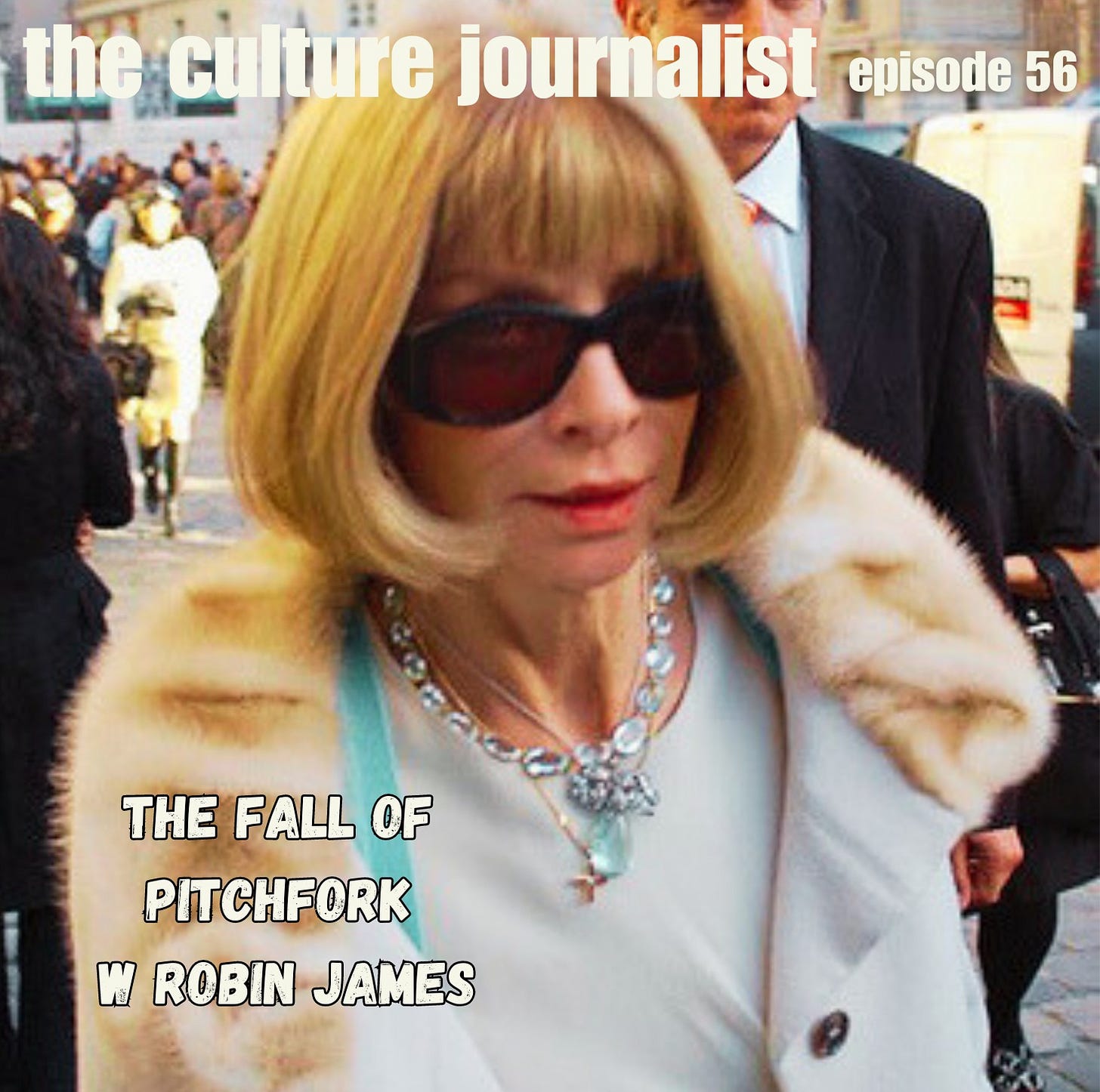The Culture Journalist is a podcast about culture in the age of platforms. Episodes drop every other week, but if you want the full experience — including bonus episodes, culture recommendations, and our eternal parasocial friendship — we recommend signing up for a paid subscription. All earnings go back into making the show.
Hey pals. In January, Condé Nast shocked the entire independent music world when it announced it was laying off most of Pitchfork’s staff and folding what remained into GQ. Emilie especially felt this one — Pitchfork was her first media job, working as an editor for their underground music sister-site Altered Zones, which made it particularly strange to hear that the publication was merging with a website for men who can pronounce “visvim.” Whatever you thought about Pitchfork during its three-decade run as a standalone music publication, the image of Anna Wintour wearing sunglasses as she informed the staff about the site’s fate pointed to a previously unthinkable reality: If the biggest music publication in the English-speaking world couldn’t survive the media bloodbath that is rapidly unfolding all around us, would we soon be living in a world with no music journalism at all?
There is no way of knowing exactly how Condé arrived at this decision. Wintour wrote a note to staff saying that “this decision was made after a careful evaluation of Pitchfork’s performance and what we believe is the best path forward for the brand so that our coverage of music can continue to thrive within the company” — which doesn’t tell us much. Others have accused Condé of doing layoffs as a form of union busting. And it is also safe to say that Pitchfork, like so many digital media publications, was wrestling with many of the larger structural forces we often talk about on this show (see: Google and other distribution platforms deprioritizing news, streaming services’ monopoly on music discovery, and declining programmatic advertising revenues).
Needless to say, there are a lot of takes floating around. But one in particular — by writer, editor, music scholar, and philosopher Robin James, on her always-intriguing It’s Her Factory blog — really caught our eye, especially for the head-on way in which it dealt with the dissonance of Pitchfork being folded into a men’s publication. In a post titled “Pitchfork, ‘Bro-ified’ Alt Rock Radio, and the Structural Issues in the Financialized Media Industry” Robin frames the move as just one in a long line of examples of corporations turning to male audiences in order to “save” distressed music media properties. Which isn’t because men are actually more likely to care about music or music writing, but because it’s a logic that plays into the gendered biases of the executive and ownership class. And because in today’s heavily financialized economy, business leaders are more concerned with creating the perception of future growth than coming up with solutions that actually work.
Robin joins us to talk about what the Pitchfork news can tell us about the persistence of gendered stereotypes around music fandom and consumption, and how media’s current woes are a reflection of a larger business landscape where exponential scalability takes precedence over sustainability and even profitability. We also discuss how the financialization of everything has changed the nature of musical fame, and how the age-old poptimism/rockism binary may be increasingly obsolete as a framework for discussing power differentials in music.
This podcast was edited by Ben Newman.
Follow Robin on X
Check out Robin’s It’s Her Factory blog, which has been around for 15 years and is celebrating that milestone with a zine.
Order a copy of Robin’s 2015 book, Resilience & Melancholy: Pop Music, Feminism, Neoliberalism.
Look out for Robin’s latest book, Good Vibes Only: Phenomenology and the Biopolitics of Algorithmic Legitimation, on Duke University Press.
Read more by Robin
“From the gendered pop/rock binary to resilient or aggrieved vibes”



















Share this post